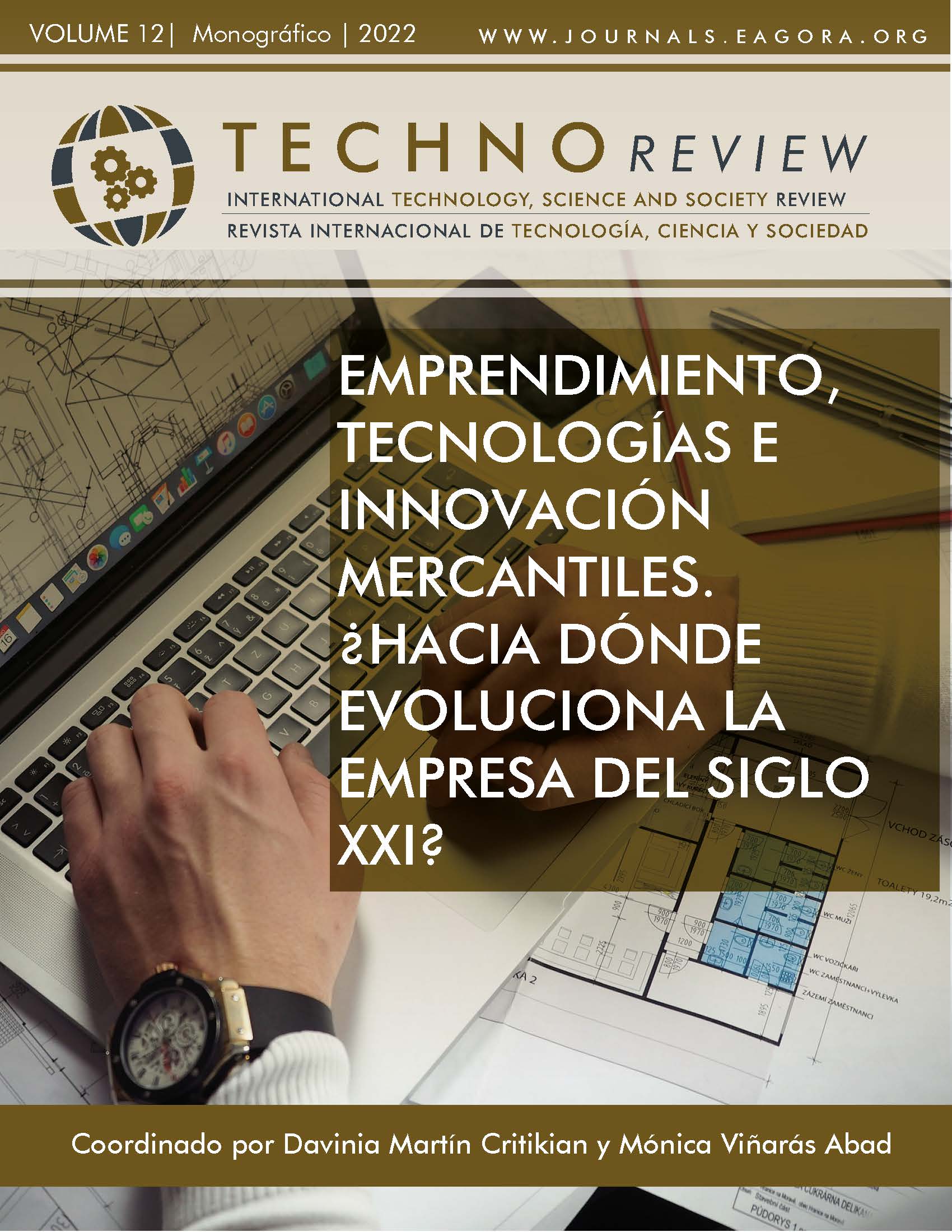Study on entrepreneurial intention in students of the degree in Social Work
Intención emprendedora en estudiantes de Trabajo Social
DOI:
https://doi.org/10.37467/revtechno.v11.4475Keywords:
Entrepreneurial intention, Entrepreneurial education, Social Work degree, Logistic regression, Factors for entrepreneurshipAbstract
A study of the determinants of entrepreneurial intention (IE) in university students of the Degree in Social Work at the beginning of their education for entrepreneurship is presented. The data obtained from a sample of students of the subject “Management of Organizations”, included in the 3rd year of the Degree at the University of Zaragoza (Spain). 139 students participated out of 184 enrolled. A logistic regression model was used to analyze the relationship between these factors and the binary variable expressing IE. Significant influence was identified in Responsibility, Creativity and Self-knowledge, with a positive effect.
References
Aadland, T. & Aaboen, L. (2018). Systematising higher education: a typology of entrepreneurship. In Hytti, U., Blackburn, R. & Laveren, E. (Eds), Entrepreneurship, Innovation and Education: Frontiers in European Entrepreneurship Research, 103-122. Edward Elgar Publishing.
Akinbola, O. A., Ogunnaike, O. O. & Amaihian, A. B. (2020). The influence of contextual factors on entrepreneurial intention of university students in Nigeria. Creating Global Competitive Economies, 1-3.
Bae, T. J., Qian, S., Miao, C. & Fiet, J. O. (2014). The relationship between entrepreneurship education and entrepreneurial intentions: A meta–analytic review. Entrepreneurship Theory and Practice, 38(2), 217-254.https://doi.org/10.1111/etap.12095
Baena-Luna, P., García-Río, E. & Monge-Agüero, M. E. (2020). Competent framework for entrepreneurship. A systematic review of the literature on its use and application. Inf. Tecnol, 31, 163-172. http://dx.doi.org/10.4067/S0718-07642020000200163
Barba-Sánchez, V. & Atienza-Sahuquillo, C. (2018). Entrepreneurial intention among engineering students: The role of entrepreneurship education. European Research on Management and Business Economics, 24(1), 53-61. https://doi.org/10.1016/j.iedeen.2017.04.001
Bosma, N. S. & Kelley, D. (2019). Global Entrepreneurship Monitor 2018/2019 Global Report.
Domínguez-Pachón, M. J. (2005). Cambios sociales actuales y adaptación de la profesión a los mismos. Humanismo y trabajo social, 4, 65-90.
Fayolle, A. & Gailly, B. (2015): The Impact of Entrepreneurship Education on Entrepreneurial Attitudes and Intention: Hysteresis and Persistence. Journal of Small Business Management, 53(1): 75–93. https://doi.org/10.1111/jsbm.12065
Fargion, S., Gevorgianiene, V. & Lievens, P. (2011). Developing entrepreneurship in social work through international education. Reflections on a European intensive programme. Social Work Education, 30(8), 964-980. https://doi.org/10.1080/02615479.2010.532206
Germak, A. J. & Singh, K. K. (2009) Social Entrepreneurship: Changing the Way Social Workers Do Business, Administration in Social Work, 34:1, 79-95.
Germak, A. J. & Singh, K. K. (2010). “Social Entrepreneurship: Changing the Way Social Workers do Business.” Administration in Social Work 34 (1): 79–95. DOI: 10.1080/03643100903432974
Gray, M., Healy, K. & Crofts, P. (2003). Social enterprise: Is it the business of social work? Australian Social Work, 56(2), 141–164. https://doi.org/10.1046/j.0312-407X.2003.00060.x
Hair, J.F., Anderson, R.E. & Tatham, R.L. (1987): Multivariate data analysis. New York: Macmillan Pub. Co.
Herman, E. & Stefanescu, D. (2017): Can higher education stimulate entrepreneurial intentions among engineering and business students? Educational Studies, 43(3), 312-327. https://doi.org/10.1080/03055698.2016.1277134
Hernández-Mogollón, R., Fernández Portillo, A., Díaz-Casero, J.C. & Sánchez-Escobedo, M. C. (2018). ¿Es posible trabajar la educación emprendedora universitaria en contextos poco favorables para ello? Journal of Management and Business Education, 1(2), 160-181.
Krueger, N. F. (2003). The cognitive psychology of entrepreneurship. En Zoltan J. Acs y David B. Audretsch (Eds.), Handbook of entrepreneurship research (pp. 105-140). Boston, MA: Springer.
Liñán, F. & Chen, Y. W. (2009). Development and cross–cultural application of a specific instrument to measure entrepreneurial intentions. Entrepreneurship Theory and Practice, 33(3), 593-617. https://doi.org/10.1111/j.1540-6520.2009.00318.x
Liñán, F., Rodríguez-Cohard, J. C. & Rueda-Cantuche, J. M. (2011). Factors affecting entrepreneurial intention levels: a role for education. International entrepreneurship and management Journal, 7(2), 195-218.
Michavila, F., Martínez, J. M., Martín-González, M., García Peñalvo, F. J. & Cruz-Benito, J. (2016). Barómetro de empleabilidad y empleo de los universitarios en España, 2015 (Primer informe de resultados). Observatorio de Empleabilidad y Empleo Universitarios.
Nandan, M. & Scott, P. A. (2013). Social entrepreneurship and social work: The need for a transdisciplinary educational model. Administration in Social work, 37(3), 257-271. https://doi.org/10.1080/03643107.2012.684428
Prince, M. J. (2001) How Social is Social Policy, Fiscal and Market Discourse in North American Welfare States. Social Policy and Administration, 35(1), 2–13. https://doi.org/10.1111/1467-9515.00216
Slater, S. (1995): Issues in conducting marketing strategy research. Journal of Strategic Marketing, 3(4), 257-270.
Teixeira, S. J., Casteleiro, C. M. L., Rodrigues, R. G. & Guerra, M. D. (2018). Entrepreneurial intentions and entrepreneurship in European countries. International Journal of Innovation Science, 10(1), 22-42. https://doi.org/10.1108/IJIS-07-2017-0062
Touriñán López, J. M. (2021). La ‘tercera misión de la universidad, transferencia de conocimiento y sociedades del conocimiento: una aproximación desde la pedagogía. Contextos educativos: CONTEXTOS EDUCATIVOS, 26 (2020), 41-81. http://doi.org/10.18172/con.4446
Vázquez-Burgete, J. L., Lanero, A. & Raisiene, A. G. (2012). Entrepreneurship education in humanities and social sciences: are students qualified to start a business? Business: theory and practice, 13(1), 27-35.
Vodă, A. I. & Florea, N. (2019). Impact of personality traits and entrepreneurship education on entrepreneurial intentions of business and engineering students. Sustainability, 11(4), 1(4):1192. https://doi.org/10.3390/su11041192
Downloads
Published
Issue
Section
License
Copyright (c) 2022 TECHNO REVIEW. International Technology, Science and Society Review /Revista Internacional de Tecnología, Ciencia y Sociedad

This work is licensed under a Creative Commons Attribution-NoDerivatives 4.0 International License.
All articles are published under an Attribution-NoDerivatives 4.0 International (CC BY-ND 4.0) license. Authors retain copyright over their work.

